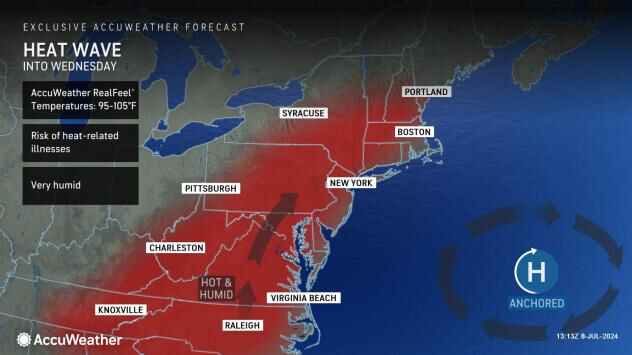Eastern US is facing dangerous heat and humidity
Even though the next three weeks typically bring the highest temperatures of the year for much of the Northeast, the ongoing heat can be dangerous for some individuals, especially when the air becomes very humid, AccuWeather meteorologists caution. It is considered a heat wave for much of the Northeast when the temperature hits 90 degrees for three or more days.
How humid the air is when it gets hot can be a game changer as far as tolerance and safety is concerned. Unlike the southwestern United States, where the air is usually very dry, humid air often accompanies hot weather in the Eastern states. This heavy air will stick around through the week, with temperatures peaking into Wednesday.
Widespread highs in the 90s are expected for most areas east of the Appalachians, with some valleys in the mountain range also approaching or exceeding 90 degrees. Along the Interstate 95 corridor, actual temperatures will come close to the 100-degree mark in cities such as Washington, D.C., Baltimore, and Richmond, Virginia. Because this is typically the hottest time of the year, few daily record highs are likely to be set.
Even in Philadelphia, with a high in the mid-90s, and New York City and Boston, with highs near 90, the heat will feel more intense due to the mid-July sun. New York City’s Central Park thermometer reached 95 on Monday, which was the highest temperature of the year so far.
The key factor in all cases will be the high humidity. Meteorologists look at the dew point temperature to determine just how humid the air may feel. The dew point is the temperature at which the air will be saturated to 100% humidity if it could be cooled down that much. When dew point temperatures hit 70 along I-95, for example, that is considered a humid day by most people’s standards.
However, through midweek and into Thursday in some cases, dew point temperatures will climb well into the 70s and will top 80 in some areas of the mid-Atlantic. The more humid the air is, the more difficult it is for the body to regulate its core temperature, as the natural cooling mechanism—evaporation of perspiration—becomes less effective.


